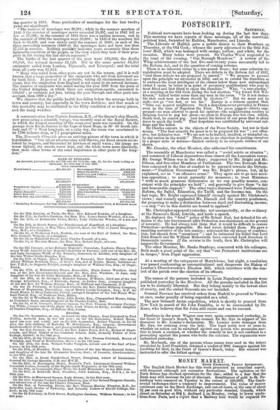POSTSCRIPT.
SATURDAY.
Political movements have been looking up during the last few days. This morning we have reports of three meetings, all of the convivial- political kind, furnished by Halifax, Manchester, and Lincoln. The Liberals of Halifax gave a public dinner to their Members on Thursday, at the Old Cock ; whence the party adj, ourned to the Odd Fel- lows' Hall, which was bedraped with orange, yellow, and white, for the occasion. Many ladies were present. Sir Charles Wood responded to the toast of the evening, " Our Borough Members." A review of the Whig achievements of the last five-and-twenty years necessarily led to the Reform Act, and to the question of coming reforms. There is no inherent virtue in a ten-pound house ; but some criterion for registration must be adopted. There are defects in the Reform Act of 1832, "and those defects we are prepared to amend." " We propose to proceed upon the principle we advocated in 1832, and so to extend the franchise as to embrace the most intelligent of the classes below those now enfranchised (what I mean by below is in point of pecuniary qualification) who may be most fitted and best fitted to enjoy the franchise." Why, "a non-elector," at meeting at the Old Cock during the last election, "my friend Bob Wil- kinson," talked better sense than any man in the room. Is it not desira- ble that such men as these should be electors ? " But we must not be rash—not go " too fast, or too far." Europe is a witness against that. "Take our nearest neighbours. Such a despotism never prevailed in France even in the time of Napoleon the First. The press gagged—liberty sup- pressed—no man allowed to speak his opinion—the neighbouring country of Belgium forced to gag her press—no press in Europe free but ours, which, thank God, he cannot gag. And hence his hatred of our press that it alone dares to speak the truth." That despotism was established by universal suf- frage and the ballot.
Sir Charles concurs in the objects of the Peace Society, but not in their means. "The best security for peace is to be prepared for war " ; not offen- sive, but defensive war. "We are not to be bullied, insulted, or trampled on, by any nation in the world." There can be no objection to putting ourselves in a proper state of defence—limited entirely to an adequate defence of our shores.
Mr. Crossley, the other Member, also addressed his constituents.
The assembly at Manchester was called a " social soirée or reunion" and consisted of Liberal deputations from almost all the Lancashire towns. Mr. George Wilson was in the chair; supported by Mr. Bright and Mr, Gibson, and five other Members of Parliament. The two Borough Mem- bers concurred in the line of conduct to be pursued towards the GnVern- ment—" Coalition Government" was Mr. Bright's phrase, but,-pe he explained, not in "an offensive sense." They agree not to go into need- less opposition ; to await patiently for measures ; to treat Ministers " with as much generous forbearance as we can possibly muster, con- sistent with the principles we hold" ; and generally to give them "a fair and honourable support." The other topics discussed were Parliamentary Reform, the Ballot, Education, the Tariff, and the Income-tax. On the last topic, Mr. Bright expressed himself strongly against Mr. Gladstone's views ; and warmly applauded Mr. Disraeli and the country gentlemen, for proposing to make a distinction between fixed and fluctuating income, —a step "we in this district are bound to applaud."
Mr. Christopher appeared yesterday, not unexpectedly, at the ordinary at the Saracen's Head, Lincoln, and made a speech.
He deplored the " fatal " policy of Sir Robert Peel, but defended his ad- hesion to the late Government after Protection was abandoned, on the ground of necessity. He had always told them that it would be difficult to restore Protection—perhaps impossible. He had never deluded them. He gave a rambling narrative of the late session ; reiterated the old charge of combina- tion, but shrank from "conspiracy " ; and he intimated his belief that Lord John Russell and Sir William Molesworth have converted Lord Aberdeen to Democratic courses. If the reverse is the truth, then Mr. Christopher will support the Government.
The other Member, Mr. Banks Stanhope, concurred with his colleague. Both made a great point of the cry that "our Protestant institutions are in danger," from Papal aggression.


























 Previous page
Previous page